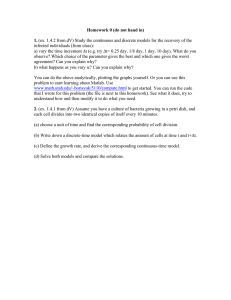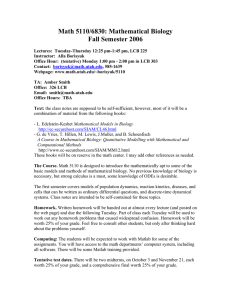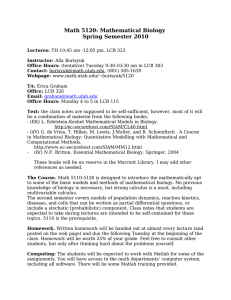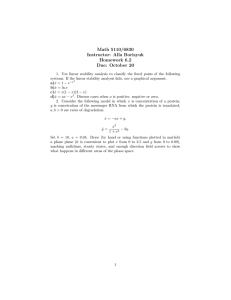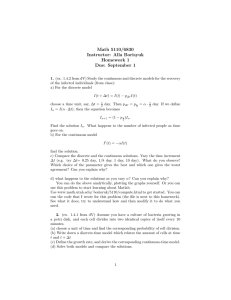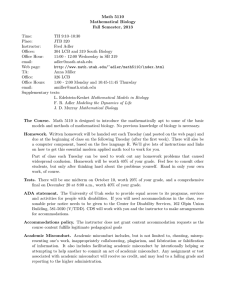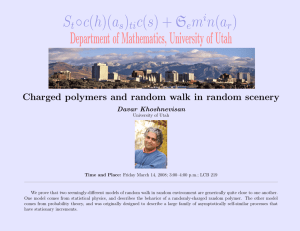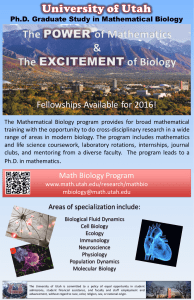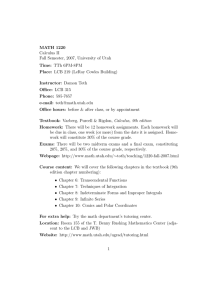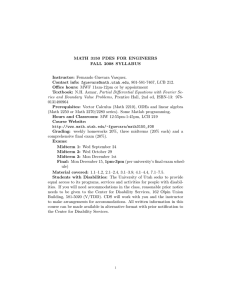Math 5110/6830: Mathematical Biology Fall Semester 2009
advertisement
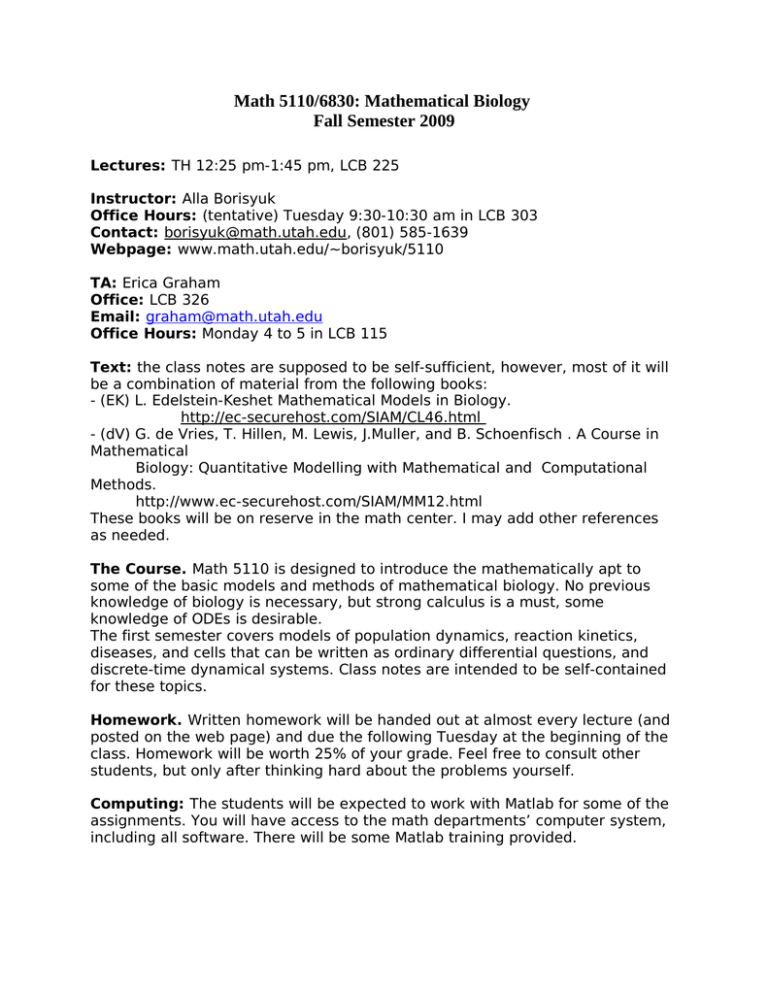
Math 5110/6830: Mathematical Biology Fall Semester 2009 Lectures: TH 12:25 pm-1:45 pm, LCB 225 Instructor: Alla Borisyuk Office Hours: (tentative) Tuesday 9:30-10:30 am in LCB 303 Contact: borisyuk@math.utah.edu, (801) 585-1639 Webpage: www.math.utah.edu/~borisyuk/5110 TA: Erica Graham Office: LCB 326 Email: graham@math.utah.edu Office Hours: Monday 4 to 5 in LCB 115 Text: the class notes are supposed to be self-sufficient, however, most of it will be a combination of material from the following books: - (EK) L. Edelstein-Keshet Mathematical Models in Biology. http://ec-securehost.com/SIAM/CL46.html - (dV) G. de Vries, T. Hillen, M. Lewis, J.Muller, and B. Schoenfisch . A Course in Mathematical Biology: Quantitative Modelling with Mathematical and Computational Methods. http://www.ec-securehost.com/SIAM/MM12.html These books will be on reserve in the math center. I may add other references as needed. The Course. Math 5110 is designed to introduce the mathematically apt to some of the basic models and methods of mathematical biology. No previous knowledge of biology is necessary, but strong calculus is a must, some knowledge of ODEs is desirable. The first semester covers models of population dynamics, reaction kinetics, diseases, and cells that can be written as ordinary differential questions, and discrete-time dynamical systems. Class notes are intended to be self-contained for these topics. Homework. Written homework will be handed out at almost every lecture (and posted on the web page) and due the following Tuesday at the beginning of the class. Homework will be worth 25% of your grade. Feel free to consult other students, but only after thinking hard about the problems yourself. Computing: The students will be expected to work with Matlab for some of the assignments. You will have access to the math departments’ computer system, including all software. There will be some Matlab training provided. Tentative test dates. There will be two midterms, on October 8 and November 19, each worth 25% of your grade, and a comprehensive final worth 25% of your grade. Extra-credit and 6830 requirements: Occasionally extra-credit homework problems will be given. These are required for students registered for 6830, and optional for all others. The students who do well on these problems will be allowed to do a fun class project, instead of a final, in the last week or so of class. Tentative course outline Dates Topic August 25 August 27 September 1,3 September 8,10 September 15,17 September 22,24 Sep. 29, Oct.1 Introduction to mathematical biology Intro to Matlab (LCB 115) Linear discrete-time equations Non-linear scalar discrete-time equations Systems of non-linear discrete-time equations. Applications Examples of continuous models October 6, 8 October 20, 22 October 27, 29 November 3, 5 November 10, 12 November 17, 19 December 1,3,8,10 Geometric approach to model analysis Review and Midterm Bifurcations Applications: Population and disease dynamics Applications: Cellular/Molecular events Applications: Excitable systems Chapters (as an idea only; actual material covered will differ; come to class!) EK: ch 1 EK: 2.1-2.6; dV: 2.1,2.2 EK: 2.7-2.9, 3.3-3.4, dV: 2.3 EK ch4; dV 3.1-3.3 EK ch5; dV 3.4 dV 3.7 EK ch7 EK ch8 Review and Midterm Supplementary material/Projects/ Final Preparation ADA statement. The University of Utah seeks to provide equal access to its programs, services and activities for people with disabilities. If you will need accommodations in the class, reasonable prior notice needs to be given to the Center for Disability Services, 162 Olpin Union Building, 581-5020 (V/TDD). CDS will work with you and the instructor to make arrangements for accommodations
